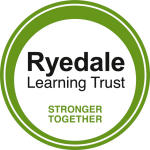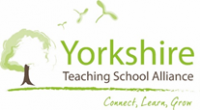Rationale
Ryedale School is committed to the principle of developing the best possible learning opportunities for all of its students. The Physical Education curriculum offers work that extends our students with activities that enrich and promote high achievement and good progress. Specific tasks are set at a higher level than that of their peers and use a wider range of contexts and resources for learning. These students will be encouraged to move through their learning at a faster rate than their peers. The Physical Education Department will work co-operatively with external partners to cater for those students who have a high level of demand made upon their time as a result of their involvement in high level sporting activities outside of school.
Aims
• To identify the needs of the individual student and provide a challenging, stimulating and innovative learning environment within and beyond the PE curriculum.
• To provide a supportive working environment which is low in stress and high in challenge.
• To encourage and develop quality and excellence using appropriately set targets which realise potential.
• To encourage students to take responsibility for their education, becoming confident and independent learners.
• To provide an environment in which students experience success, which in turn is recognised and celebrated.
• To provide students with opportunities for accreditation through examination PE and Leadership awards.
• To help students develop their personal qualities which will enable them to maximise their sporting potential and be transferable to other areas of their education.
• To provide appropriate enrichment activities that develop their experience of the world.
• To provide students with exit routes to further development of their sporting talents.
• To encourage a partnership between students, school, parents and other relevant agencies.
Definition of ‘More Able’
In order to aid with the identification of ‘More Able’ students it is important that we have a clear vision of the characteristics we are likely to observe:
• Perform exceptionally well at one sport or to a good standard in many.
• Good spatial awareness.
• Good understanding of movement quality such as weight and time.
• Skilful body management showing a high degree of control and coordination.
• Able to combine movements fluently, precisely and accurately.
• Learn, understand and adopt technical aspects of a sport very quickly.
• Able to make correct decisions in pressure situations and adapt their technique accordingly.
• Creative, original and adaptable; able to respond quickly to new challenges and situations, often finding new and innovative solutions.
• Able to reflect on processes and outcomes in order to improve performance, taking into account the relationship between skill, fitness and tactics or composition.
• Able to work independently and with initiative. Show a high degree of motivation to practice and performance.
Identification
With a clear vision of the definition of a ‘More Able’ performer we must now ensure that all possible opportunities for successful identification take place. A ‘Talented Register’ is collated by all interested parties and is shared with the school’s More Able co-ordinator who includes it in all whole school documentation. Identification of this group will take place using a combination of the following sources of information:
• Data stored on the Physical Education database.
• Discussion between colleagues at departmental meetings and other focussed times.
• Evidence from the School Sports Reports and notification from parents at school consultation days.
• Notification from District, County, Regional and National sporting organisations.
• Notification from the community sports network, professional clubs and National Governing Bodies.
Provision
In order to address the needs of ‘More Able’ students it is essential that we consider the provision we offer under a number of titles:
Curriculum Planning
The curriculum planned will offer as much breadth and diversity as resources will allow and will be reviewed on an annual basis.
• Units of Work within the overall departmental Scheme of Work are fluid and allow students to access accelerated opportunities. Skills and knowledge grids are used in each activity so students know what is required to progress.
• Students are able to miss stages when evidence demonstrates their performance substantially exceeds that of their peers.
• All Units of Work and Lesson Planning include challenging extension activities.
• Time is planned within each Unit of Work to allow for focussed target setting based on potential attainment against National Curriculum Levels of Attainment.
• Teaching groups are divided where possible based upon evidence from the Assessment database and are reviewed on a regular basis taking into account prior performance in generic activity areas.
• All registers are updated with information from the ‘More Able Register’ indicating the specific abilities of those students to allow for further sub-division of groups for relevant task setting e.g. physical, cognitive, creative groups.
• Consultation with external agencies will take place to ensure that curriculum alterations can be made when necessary to allow for the demands of training or competition.
• Curriculum planning is conducted in conjunction with the whole school More Able Co-ordinator to allow involvement in more generic strategies for developing the students.
Teaching Strategies
• Differentiation is managed through pace, task, dialogue, input, support, resource, content, responsibility and independence as well as through outcome.
• Teaching styles are varied and reflect the specific abilities of the student.
• The learning style that best suits the student is investigated and teaching is adapted to suit this.
• Lessons provide opportunities for students to find creative solutions to challenges, take risks and cope with failure.
• Teaching staff encourage independent work.
• Students are encouraged to refine their work by reviewing and evaluating.
• Open questioning is used to stimulate an increased depth of understanding.
• Staff discuss with students what they are learning and encourage them to identify their own learning needs.
• Opportunities are provided for students to work together in a range of learning situations.
• Extension work is provided that is exciting and challenging.
• Homework tasks are set with a variety of levels of challenge.
Assessment Strategies
• Assessment of all activities is conducted against the five strands of the National Curriculum in order to recognise all abilities.
• Students have a clear understanding of the assessment criteria used.
• Assessment grids are available within the changing rooms which allow pupils to identify their current level of performance and what they need to do to access the next level.
• Assessment takes place at the end of each activity and used to inform future planning and student target setting.
• Self and peer assessment by students is encouraged and feeds into judgements made by staff.
Enrichment Opportunities
• The extra-curricular programme of the school provides extended opportunities for students to develop their abilities through coaching and competitive situations.
• Students are informed of all opportunities through their form notice boards and the PE department displays.
• In appropriate situations students are encouraged to participate in activities with students who are older than themselves.
• An expansive programme of competitive fixtures is provided in a wide range of sports.
• Students are encouraged to participate in District and County development and selection programmes.
• ‘School Colours’ are awarded to talented students reflecting and celebrating their abilities and achievements.
• Regular festivals and tournaments for talented students are hosted at the school through the school sports partnership.
• Students with Sports Leaders Level 1 are involved with organising and leading extracurricular activities and area tournaments.
• Information is provided for students regarding all local sporting organisations and exit routes for their chosen activity.
Professional Development
In order to ensure the success of strategies for identifying and providing for talented students, staff at Ryedale School are engaged in the following professional development processes:
• Deployment of a designated More Able co-ordinator for Physical Education.
• Annual evaluation of policy and the success of its implementation.
• Annual review of schemes and units of work.
• Regular discussion regarding talented students at departmental meetings.
• Sharing of teaching strategies for talented students in PE.
• Advice on how to mentor a talented student.
• Peer lesson visits and observations to share good practice.
• Standardisation of assessment and identification criteria.
• Inset provided by NGB’s and other experienced providers.


 Ryedale School is a partner in and co-ordinator for the Yorkshire Teaching School Alliance.
Ryedale School is a partner in and co-ordinator for the Yorkshire Teaching School Alliance.